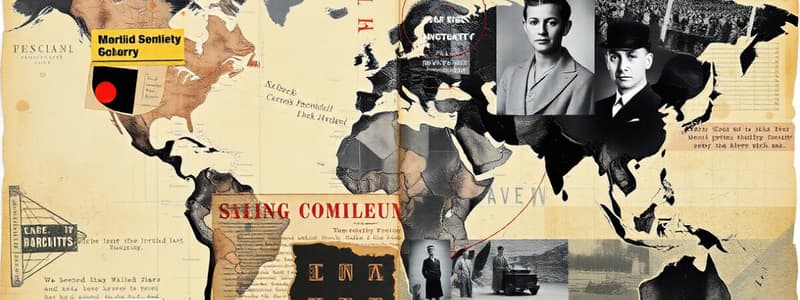Podcast
Questions and Answers
Following the period of imperialism, why did Europeans begin to reconsider their approach to colonialism?
Following the period of imperialism, why did Europeans begin to reconsider their approach to colonialism?
- Colonies refused to adopt new technologies.
- Peaceful commercial interactions proved more profitable and less problematic. (correct)
- Financial costs decreased significantly.
- Colonies rejected European lifestyles.
What role did colonies serve as a 'safety valve' during the age of imperialism?
What role did colonies serve as a 'safety valve' during the age of imperialism?
- They provided a space to release hostility and avoid conflicts in Europe.
- They became centers for international trade and cooperation.
- They facilitated diplomatic negotiations between European powers. (correct)
- They served as testing grounds for new military technologies.
What was the relationship between imperialism and the concept of 'Great Power' status?
What was the relationship between imperialism and the concept of 'Great Power' status?
- Having a large colonial empire was considered essential to being recognized as a great power.
- Colonial possessions were viewed as a liability, weakening a nation's claim to great power status.
- A nation's industrial output determined its great power status, irrespective of colonial possessions. (correct)
- Great power status was solely determined by military strength, with colonies playing a minor role.
How did the Boer War impact international relations leading up to World War I?
How did the Boer War impact international relations leading up to World War I?
Which agreement between France and Britain was a direct consequence of colonial tensions and rivalries?
Which agreement between France and Britain was a direct consequence of colonial tensions and rivalries?
What was the long-term impact of the tensions among the European powers in the colonies?
What was the long-term impact of the tensions among the European powers in the colonies?
How did colonial wars contribute to European overconfidence prior to World War I?
How did colonial wars contribute to European overconfidence prior to World War I?
What was the most detrimental outcome of colonialism with regard to geographic boundaries?
What was the most detrimental outcome of colonialism with regard to geographic boundaries?
Following World War I, how did the redrawing of borders impact regions such as Yugoslavia and the Middle East?
Following World War I, how did the redrawing of borders impact regions such as Yugoslavia and the Middle East?
How did colonial agriculture practices focused on monoculture impact colonized regions?
How did colonial agriculture practices focused on monoculture impact colonized regions?
How did colonial infrastructure projects typically benefit the colonizers?
How did colonial infrastructure projects typically benefit the colonizers?
What harmful impacts did cultural transformations during colonialism sometimes have on colonized societies?
What harmful impacts did cultural transformations during colonialism sometimes have on colonized societies?
What was a significant demographic consequence of cultural exchange during the colonial era?
What was a significant demographic consequence of cultural exchange during the colonial era?
How did colonization affect industrialization worldwide?
How did colonization affect industrialization worldwide?
After imperialism, what development did colonies experience regarding technology?
After imperialism, what development did colonies experience regarding technology?
What did the tensions amount to when alliances were created among powers in the colonies?
What did the tensions amount to when alliances were created among powers in the colonies?
What did colonial wars create for the European military?
What did colonial wars create for the European military?
What did the drawing of geographic borders do in colonalism?
What did the drawing of geographic borders do in colonalism?
What did colonial agriculture focus on?
What did colonial agriculture focus on?
What did demographic changes bring to africa, australia, and the americas?
What did demographic changes bring to africa, australia, and the americas?
Flashcards
Imperialism Aftermath
Imperialism Aftermath
Aftermath of imperialism involves Europeans reconsidering colonialism, colonies adopting new technology, and Europeans favoring peaceful commercial interaction.
Colonies as 'Safety Valves'
Colonies as 'Safety Valves'
Colonies acted as a 'Safety Valve,' releasing continental tensions and conflicts through proxy wars, which protected the home front.
Colonies causing WWI
Colonies causing WWI
Tension among powers and alliances in the colonies indirectly led to WWI and precipitated events like the Balkan Wars.
Imperialism and War tactics
Imperialism and War tactics
Signup and view all the flashcards
Colonial borders draw
Colonial borders draw
Signup and view all the flashcards
Colonial Monoculture
Colonial Monoculture
Signup and view all the flashcards
Colonial Transformation
Colonial Transformation
Signup and view all the flashcards
Colonization vs Industrialization
Colonization vs Industrialization
Signup and view all the flashcards
Entente Cordial of 1904
Entente Cordial of 1904
Signup and view all the flashcards
Study Notes
Imperialism: Aftermath
- The primary questions revolve around the long-term gains from imperialism and whether the costs aligned with the rewards for both Europeans and native populations
- Following the period of colonialism, Europeans began to reconsider their stance
- Colonies integrated new technologies and European lifestyles
Commercial Interactions
- Europeans favored peaceful commercial interactions, finding them more profitable and less problematic
- Imperialism resulted in lives lost on all sides, especially in the military, alongside heavy financial costs
- Imperialism continued despite all this, because intense rivalry in colonies caused tension
- Colonies served as "safety valves," releasing hostility and conflicts that might have otherwise occurred in Europe directly
- Proxy wars in the colonies helped preserve peace on the home front
Colonial Race
- Being a "Great Power" was synonymous with possessing a substantial colonial empire, prompting many powers to participate in the colonial race across continents
- The colonial race may have been a contributing factor to World War I
- The Boer War damaged relations between Anglo-German
- The Boer War strengthened relations between Anglo-French
Alliances
- The war led to an agreement between France and Britain, formerly long-standing adversaries, resulting in the Entente Cordial of 1904
- France gained control in Morocco
- Britain gained control in Egypt
- Germany, frustrated by these developments, sought out new alliances
- Italy invaded Libya in 1911
- Tension among the great powers in the colonies indirectly contributed to World War I
Direct Impact
- Alliances and counter-alliances had a direct impact on World War I, precipitating the Balkan Wars of 1912-1914
- Battles were fought against weaker opponents
- Brutal punitive campaigns were enough to instill fear and subjugation
- Colonial wars fostered overconfidence in the European military
Declaration of War
- War was perceived as a "win-win situation," facilitating the declaration of World War I
- Redrawing geographic borders was a major consequence of colonialism, done without regard for race, ethnicity, or religion
- Borders were created without consulting native populations
- People were grouped or separated based on colonial interests
- Post-WWI, independence led to border changes
Territorial Changes
- Independence was executed either peacefully or aggressively, which included Yugoslavia, the Middle East, Armenia, Nagorno-Karabakh, Chechnya, and other regions
- Colonial agriculture focused on cash crops, which primarily benefited the colonizers
- Infrastructure was built to serve colonial business interests and was financed by the colonies
Cultural Transformations
- Cultural transformation affected language, customs, education, and rituals
- Some traditional practices such as witchcraft, scarification, female circumcision, and infanticide were harmful and were removed
- Rapid change can be destructive, affecting family life and communal cohesion
- Cultural exchange had some positive outcomes but also created new, unsolvable problems
- Demographic shifts occurred in Africa, Australia, and the Americas, leading to the resettlement of different races
Industrialization
- Colonization sped up industrialization worldwide
- It remains questionable whether the price of modernization was justified
- It remains questionable if progress could have occurred without colonization
Studying That Suits You
Use AI to generate personalized quizzes and flashcards to suit your learning preferences.




